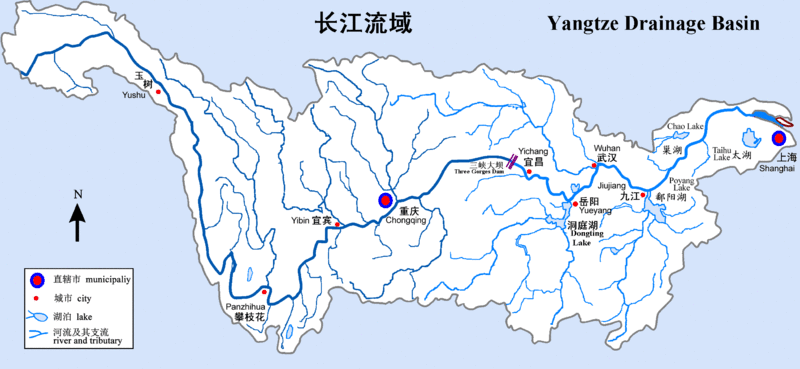The bridges and tunnels across the Yangtze River carry rail and road traffic across China's longest and largest river and form a vital part of the country's transportation infrastructure. The river bisects China proper from west to east, and every major north-south bound highway and railway must cross the Yangtze. Large urban centers along the river such as Chongqing, Wuhan, and Nanjing also have urban mass transit rail lines crossing the Yangtze.
Pontoon bridges have been used by militaries for two thousand years on the Yangtze, but until the completion of the Wuhan Yangtze River Bridge in 1957, there were no permanent bridges along the main stretch of the river known as Chang Jiang (the "Long River"), from Yibin to the river mouth in Shanghai, a distance of 2,884 km (1,792 mi). Since then, over 75 bridges and six tunnels have been built over this stretch, the overwhelming majority since 1990. They reflect a broad array of bridge designs and, in many cases, represent significant achievements in modern bridge engineering. Several rank among the world's longest suspension, cable-stayed, arch bridges, truss and box girder bridges as well as some of the highest and tallest bridges.
Upriver from Yibin, bridge spans are more common along the Jinsha and Tongtian sections where the Yangtze is much narrower, although numerous new bridges are being added. The oldest bridge still in use is the Jinlong, a simple suspension bridge over the Jinsha section of the river in Lijiang, Yunnan that was originally built in 1880 and rebuilt in the 1936.[1]
Section names of the Yangtze
Due to changes in the designation of the source of the Yangtze, various sections of the river have been thought of as distinct rivers with different names. The bridges and tunnels of the Yangtze have compound names consisting of the location name and the river section name. Today, the river has four sectional names in (Chinese) : (1) Tuotuo, (2) Tongtian, (3) Jinsha and (4) Chang Jiang.
- The Tuotuo River, considered the official headstream of the Yangtze, flows 358 km (222 mi) from the glaciers of the Gelaindong massif in the Tanggula Mountains of southwestern Qinghai to the confluence with the Dangqu River to form the Tongtian River.
- The Tongtian continues for 813 km (505 mi) to the confluence with the Batang River at Yushu in south central Qinghai.
- The Jinsha or Gold Sands River continues for 2,308 km (1,434 mi) along the border of western Sichuan with Qinghai, Tibet, and Yunnan, through northern Yunnan and southern Sichuan to the confluence with the Min River at Yibin in south central Sichuan.
- Chang Jiang or the "Long River" refers to the final 2,884 km (1,792 mi) of the Yangtze from Yibin through southeastern Sichuan, Chongqing, western Hubei, northern Hunan, eastern Hubei, northern Jiangxi, Anhui and Jiangsu to the river's mouth in Shanghai. Chang Jiang is generally substituted by "Yangtze" in English usage.
For example, the Nanjing Chang Jiang Bridge is translated as the Nanjing Yangtze River Bridge. The Taku Jinsha River Bridge is a bridge along the Jinsha section of the Yangtze.
History
The Yangtze River forms a major geographic barrier dividing northern and southern China. For millennia, travelers crossed the Yangtze by ferry. In the first half of the 20th century, rail passengers from Beijing to Guangzhou and Shanghai had to disembark, respectively, at Hanyang and Pukou, and cross the river by steam ferry before resuming journeys by train.
Bridges in antiquity
Pontoon bridges
The earliest recorded pontoon bridge over the Yangtze was the Jiangguan Pontoon Bridge built in AD 35 by Gongsun Shu, the ruler of Sichuan, in the war with the Han Emperor Liu Xiu.[2][3] Gongsun Shu built the pontoon across a narrow part of the river between Jingmen and Yichang in (modern Hubei Province) to block the Han Emperor's navy from sailing upriver into Sichuan.[3] The pontoon was burned in battle and Liu Xiu went on to capture Sichuan.[3]
In 570, the Northern Zhou general Chen Teng built a crude suspension bridge across the Xiling Gorge using thick rope and reeds to carry food and provisions for his troops on the south bank. The bridge was cut apart by boats lined with sharp knives sent down river by the Chen general Zhang Shaoda.[4]
During the Tang Dynasty, a pontoon bridge was built in Sangouzhen in the Qutang Gorge in 619.[2][4]
In 974, during the Song Emperor Zhao Kuangyin's conquest of the Southern Tang, a pontoon over 1,000 meters long linked together by bamboo chains was erected in just three days at Caishiji (Ma'anshan, Anhui Province) and enabled the Song Army to advance swiftly across the river and capture Nanjing, the Southern Tang capital.[2][3]
The Taiping rebels made extensive use of pontoons on the Yangtze in their campaign against the Qing Dynasty in the Yangtze Basin.[3] In December 30, 1852, they built two pontoons nearly 3,000 meters long in a fortnight's time at Baishazhou and Yingwuzhou in Wuhan to move troops from Hanyang on the north bank to the Wuchang on the south bank.[3] The Taipings tied together small boats into twos and threes and steered these preassembled pieces simultaneously into the river, and used iron anchors to set the pontoons instead of chains. They added leather-covered walls to the bridges and added towers and firing positions.[3]
Pontoon bridges have not been a feasible long-term solution to cross river transport because they block boat traffic on the Yangtze, a major conduit for travelers and cargo between the coast and the Chinese interior.
Iron chain bridges
Dating back to 3rd century, militaries of antiquity have stretched iron chains across the Yangtze in the Three Gorges to block invading armies. Notable examples include the iron chain defense of the Wu Kingdom in the Xiling Gorge against the Jin Dynasty in 280, the Former Shu's chain across Kuimen in the Qutang Gorge against the Jingnan in 925, and Song general Xu Zongwu's seven-link chain at the same location against the Mongols in 1264.[4]
The first documented iron chain bridge across the river was built in the 7th century by the Tibetan Empire over the Jinsha. The Shenchuan Iron Bridge, a simple suspension bridge, stood at what is today Tacun of Weixi Lisu Autonomous County in the Dêqên Tibetan Autonomous Prefecture of northwestern Yunnan Province, and was probably built to help the Tibetan military advance against the Kingdom of Nanzhao during its invasions between 682 and 704.[6] The Tibetans stationed a frontier command office in the town called the Shenchuan Iron Bridge jiedushi.[6] The bridge facilitated trade between the two countries until 794 when the Nanzhao realigned with the Tang Dynasty and destroyed the bridge in a war with the Tibetan Empire.[6][7]
The oldest bridge still in use on the Yangtze is the Jinlong Bridge in Lijiang, a simple iron chain suspension bridge first built during the Qing Dynasty from 1876 to 1880.[8] It was destroyed in a flood in 1935 and rebuilt the following year.[8] The bridge was named a National Historical Site in 2006.[8]
Iron chain bridges are more durable than pontoon bridges and allow for year-round use, although when the river level is high during the flood season, boards on the bridge deck must be removed.[9]
Modern bridges
Chang Jiang
The first permanent bridge to cross the Chang Jiang section of the river was the Wuhan Yangtze River Bridge, built from 1955 to 1957. The dual-use road-rail bridge was a major infrastructural project in the early years of the People's Republic and was completed with Soviet assistance. The second bridge was a single-track railway bridge built in Chongqing in 1959. The Nanjing Yangtze River Bridge, also a road-rail bridge, was the first bridge to cross the lower reaches of the Yangtze. It was built from 1960 to 1968, after the Sino-Soviet split, and did not receive foreign assistance. The Zhicheng Road-Rail Bridge followed in 1971.
Only two bridges opened in the 1980s, the Chongqing's First Shibanpo Bridge in 1980 and the Luzhou Road Bridge in 1982. Both were in the upper reaches of Changjiang in Sichuan Province, to which Chongqing Municipality belonged at the time.
Bridge-building resumed in the 1990s and accelerated in the first decade of the 21st century. Jiangxi Province had its first bridge in 1993 with the opening of the Jiujiang Bridge. The first bridge in Anhui Province, the Tongling Bridge, opened in 1995. Six of the 11 bridges built in the 1990s and half of the 40 bridge crossings added in the 2000s were built in Chongqing Municipality, which became a directly-controlled municipality in 1997 to facilitate the construction of the Three Gorges and experienced a building boom.
By 2005, there were over 50 bridges across the Yangtze River between Yibin and Shanghai. The rapid pace of bridge construction has continued. The first tunnel under the Yangtze opened in Wuhan in 2008.
As of December 2014, urban Chongqing has 18 bridges, Wuhan has eight bridges and three tunnels, and Nanjing has five bridges and two tunnels. About a dozen other bridges are now under construction.
Upstream sections
In the upper reaches of the Yangtze above Yibin, the Jinsha (Gold Sands), Tongtian, and Tuotuo sections of the river are narrower and bridges are more numerous. As of December 2014, Yibin had 10 bridges across the Jinsha and Panzhihua had 16.
The Taku Jinsha River Bridge, under construction in Lijiang, is set to become the highest bridge in the world with a bridge deck that is 512 m (1,680 ft) above the surface of the river.[10]
Bridge strain

A
weigh station for the Songyuan Bridge along the Jinsha River in Yunnan
With the advent of economic growth around the country and widespread use of heavy freight trucks, bridges along the Yangtze have been bearing greater load, leading to greater strain on older bridge structures. The Jiujiang Yangtze River Bridge was originally designed to carry trucks weighing up to 30 t (33 short tons).[11] In 2008, the tonnage limit was raised to 55 t (61 short tons).[11] In November 2011, a crack was discovered in the bridge's steel structure and forced the authorities to close the bridge to freight traffic.[12] In February 2012, the tonnage limit was lowered to 20 t (22 short tons).[11] Truck traffic had to be re-routed to neighboring provinces. In 2012, a crack was discovered in one girder of the Luzhou Yangtze River Bridge, leading to bridge closure and emergency repairs.[13]
Longest and tallest bridges
Bridges over the Yangtze including some of the longest and tallest bridges in the world.
- The Runyang Bridge [2005] (1,490 m (4,890 ft)), Fourth Nanjing Bridge [2012] (1,418 m (4,652 ft)) and Jiangyin Bridge [1999] (1,385 m (4,544 ft)) are all among the ten longest suspension bridges in the world.
- The Sutong Bridge [2008] (1,088 m (3,570 ft)), Edong Bridge [2010] (926 m (3,038 ft)), Jiujiang Expressway Bridge [2013] (818 m (2,684 ft)) and Jingyue Bridge [2010] (816 m (2,677 ft)) all have cable-stayed bridge spans that rank among the top ten in the world.
- The Chaotianmen Bridge [2009] (552 m (1,811 ft)) is the longest arch bridge in the world. The Wushan Bridge [2005] (460 m (1,510 ft)) also ranks in the top ten.
- The Dashengguan Bridge [2010] and Jiujiang Bridge [1992] rank among the longest continuous truss bridges by total truss length.
- The Sutong, Jingyue, Zhongzhou [2009], and Jiujiang Expressway Bridges rank among the ten tallest in the world.
- Chongqing's Second Shibanpo Bridge [2006] set a world record for box girder bridges with a longest span of 330 m (1,080 ft).[14]
Longest span timeline
List of existing bridges and tunnels
Chang Jiang
| Name |
Image |
Location |
Province |
Opened |
Total length |
Longest Span |
Type |
Carries |
Coordinates |
Shanghai Yangtze River Bridge
[note 1] |  | Chongming, Changxing | Shanghai | 2009 | 9,997 m (32,799 ft) | 730 m (2,400 ft) | cable-stayed | 
6-lane | 31°26′06″N 121°44′39″E / 31.435°N 121.7442°E / 31.435; 121.7442 (Shanghai Yangtze River Bridge) |
Shanghai Yangtze River Tunnel
[note 1] |
 | Changxing, Pudong | 2009 | 8,950 m (29,360 ft) | – | tunnel | 31°19′33″N 121°41′40″E / 31.3258°N 121.6944°E / 31.3258; 121.6944 (Shanghai Yangtze River Tunnel) |
Chongqi Bridge
[note 1] | | Qidong,
Chongming | Jiangsu,
Shanghai | 2011 | 7,150 m (23,460 ft) | 185 m (607 ft) | box girder | 31°41′45″N 121°39′59″E / 31.6957°N 121.6663°E / 31.6957; 121.6663 (Chongming–Qidong Yangtze River Bridge) |
| Sutong Bridge | 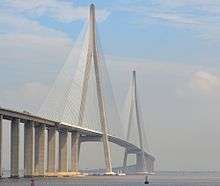 | Nantong, Changshu | Jiangsu | 2008 | 8,206 m (26,923 ft) | 1,088 m (3,570 ft) | cable-stayed | 
6-lane | 31°47′22″N 121°00′08″E / 31.7894°N 121.0022°E / 31.7894; 121.0022 (Sutong Yangtze River Bridge) |
| Jiangyin Bridge |  | Jingjiang, Jiangyin | 1999 | 3,071 m (10,075 ft) | 1,385 m (4,544 ft) | suspension | 
6-lane | 31°56′57″N 120°16′03″E / 31.9492°N 120.2674°E / 31.9492; 120.2674 (Jiangyin Yangtze River Bridge) |
Taizhou Bridge Complex
[note 2] |  | Taizhou, Yangzhong | 2012 | 12,665 m (41,552 ft) | 1,080 m (3,540 ft)x2 | suspension |  | 32°14′48″N 119°52′36″E / 32.2466°N 119.8767°E / 32.2466; 119.8767 (Taizhou Yangtze River Bridge) |
| Yangzhong, Zhenjiang | 125 m (410 ft) | box girder |
Runyang Bridge Complex
[note 3] |  | Yangzhou, Shiye Island
(Nouth Bridge) | 2005 | ~6,500 m (21,300 ft) | 406 m (1,332 ft) | cable-stayed | 
6-lane | 32°12′26″N 119°21′49″E / 32.2072°N 119.3637°E / 32.2072; 119.3637 (Runyang Yangtze River Bridge) |
 | Shiye Island, Zhenjiang
(South Bridge) | 1,490 m (4,890 ft) | suspension |
| Fourth Nanjing Bridge |  | Nanjing | 2012 | 5,437 m (17,838 ft) | 1,418 m (4,652 ft) | suspension |  | 32°10′41″N 118°56′24″E / 32.1780°N 118.9401°E / 32.1780; 118.9401 (Fourth Nanjing Yangtze Bridge) |
| Second Nanjing Bridge |  | 2001 | 2,938 m (9,639 ft) | 628 m (2,060 ft) | cable-stayed | 
6-lane | 32°09′45″N 118°50′10″E / 32.1626°N 118.8362°E / 32.1626; 118.8362 (Second Nanjing Yangtze Bridge) |
| Nanjing Yangtze River Bridge | 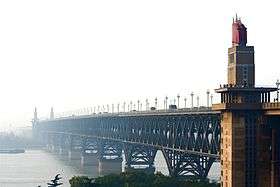 | 1968 | 4,588 m (15,052 ft) | 160 m (520 ft) | truss | .svg.png)
4-lane
Jinghu R.R.
2-track | 32°06′55″N 118°44′20″E / 32.1153°N 118.7389°E / 32.1153; 118.7389 (Nanjing Yangtze Bridge) |
| Nanjing Yangtze River Tunnel |  | 2009 | 3,837 m (12,589 ft) | – | tunnel | 6-lane highway | 31°58′14″N 118°38′28″E / 31.9706°N 118.6411°E / 31.9706; 118.6411 (Nanjing Yangtze River Tunnel) |
| Third Nanjing Bridge |  | 2005 | 4,744 m (15,564 ft) | 648 m (2,126 ft) | cable-stayed | 

6-lane | 31°58′14″N 118°38′28″E / 31.9706°N 118.6411°E / 31.9706; 118.6411 (Third Nanjing Yangtze Bridge) |
| Nanjing Metro Line 10 Tunnel |   | 2014 | 3,345 m (10,974 ft) | – | tunnel | | |
| Dashengguan Bridge | 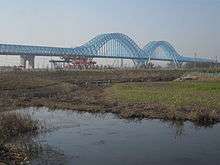 | 2010 | 1,615 m (5,299 ft) | 336 m (1,102 ft) | arch | Jinghu HSR
Huhanrong PDL
Nanjing Metro
6-track | 31°57′35″N 118°37′52″E / 31.9598°N 118.6310°E / 31.9598; 118.6310 (Dashengguan Yangtze River Bridge) |
Ma'anshan Bridge Complex
[note 4] |  | Ma'anshan | Anhui | 2013 | 11,209 m (36,775 ft) | 1,080 m (3,540 ft)x2 | suspension | 
6-lane | 31°36′36″N 118°23′32″E / 31.6101°N 118.3921°E / 31.6101; 118.3921 (Ma'anshan Yangtze River Bridge) |
 | 260 m (850 ft)x2 | cable-stayed |
| Wuhu Bridge |  | Wuhu | 2000 | 2,193 m (7,195 ft) | 312 m (1,024 ft) | cable-stayed | 
Huainan Railway | 31°23′16″N 118°20′07″E / 31.3878°N 118.3353°E / 31.3878; 118.3353 (Wuhu Yangtze River Bridge) |
| Tongling Bridge | 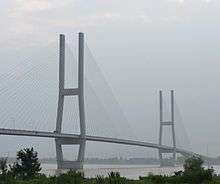 | Tongling | 1995 | 1,152 m (3,780 ft) | 432 m (1,417 ft) | cable-stayed | 
4-lane | 30°51′22″N 117°43′36″E / 30.8560°N 117.7268°E / 30.8560; 117.7268 (Tongling Yangtze River Bridge) |
| Anqing Bridge | 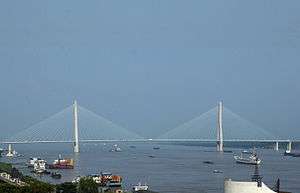 | Anqing | 2004 | 1,040 m (3,410 ft) | 510 m (1,670 ft) | cable-stayed | 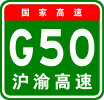 | 30°29′57″N 117°04′17″E / 30.4991°N 117.0714°E / 30.4991; 117.0714 (Anqing Yangtze River Bridge) |
| Jiujiang Bridge |  | Huangmei, Jiujiang | Hubei,
Jiangxi | 1993 | 1,806 m (5,925 ft) | 216 m (709 ft) | combined truss and arch | .svg.png)
Jingjiu R.R. | 29°45′01″N 116°00′49″E / 29.7502°N 116.0136°E / 29.7502; 116.0136 (Jiujiang Yangtze River Bridge) |
| Jiujiang Expressway Bridge |  | 2013 | 1,405 m (4,610 ft) | 818 m (2,684 ft) | cable-stayed |  | 29°43′20″N 115°54′30″E / 29.722306°N 115.908444°E / 29.722306; 115.908444 (Jiujiang Yangtze River Expressway Bridge) |
| Huangshi Bridge |  | Huangshi | Hubei
eastern | 1995 | 1,060 m (3,480 ft) | 245 m (804 ft) | beam | .svg.png) | 30°15′04″N 115°04′19″E / 30.2512°N 115.07201°E / 30.2512; 115.07201 (Huangshi Yangtze River Bridge) |
| Edong Bridge |  | Huanggang | 2010 | 1,486 m (4,875 ft) | 926 m (3,038 ft) | cable-stayed | 
 | 30°15′39″N 115°04′28″E / 30.2607°N 115.0744°E / 30.2607; 115.0744 (Edong Yangtze River Bridge) |
| Ehuang Bridge |  | Huanggang, Ezhou | 2002 | 1,290 m (4,230 ft) | 480 m (1,570 ft) | cable-stayed |  | 30°24′44″N 114°55′09″E / 30.4121°N 114.9193°E / 30.4121; 114.9193 (Ehuang Yangtze River Bridge) |
| Huanggang Bridge | 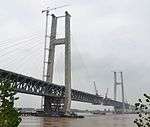 | 2014 | 1,215 m (3,986 ft) | 567 m (1,860 ft) | cable-stayed | 
Wuhuang ICR | 30°29′53″N 114°50′03″E / 30.4981°N 114.8342°E / 30.4981; 114.8342 (Huanggang Yangtze River Bridge) |
| Yangluo Bridge |  | Wuhan | 2007 | 2,735 m (8,973 ft) | 1,280 m (4,200 ft) | suspension | 

6-lane | 30°37′27″N 114°33′28″E / 30.6242°N 114.5578°E / 30.6242; 114.5578 (Yangluo Yangtze River Bridge) |
| Tianxingzhou Bridge |  | 2009 | 4,657 m (15,279 ft) | 504 m (1,654 ft) | cable-stayed | Wuhan Third Ring Road
6-lane
Wuguang HSR
Huhanrong Railway
4-track | 30°39′25″N 114°24′18″E / 30.6569°N 114.4050°E / 30.6569; 114.4050 (Tianxingzhou Yangtze River Bridge) |
| Erqi Bridge |  | 2011 | 2,922 m (9,587 ft) | 616 m (2,021 ft)x2 | cable-stayed | Wuhan Second Ring Road
8-lane | 30°37′39″N 114°20′31″E / 30.6276°N 114.3420°E / 30.6276; 114.3420 (Erqi Yangtze River Bridge) |
| Second Wuhan Bridge |  | 1995 | 1,080 m (3,540 ft) | 400 m (1,300 ft) | cable-stayed | Wuhan Inner Ring Road | 30°36′18″N 114°19′12″E / 30.6051°N 114.32012°E / 30.6051; 114.32012 (Second Wuhan Yangtze River Bridge) |
| Wuhan Yangtze River Tunnel |  | 2008 | 3,630 m (11,910 ft) | N/A | tunnel | Wuhan Inner Ring Road
4-lane | 30°34′45″N 114°18′26″E / 30.5792°N 114.3072°E / 30.5792; 114.3072 (Wuhan Yangtze River Tunnel) |
| Wuhan Metro Line 2 Tunnel |  | 2012 | 3,098 m (10,164 ft) | N/A | tunnel | | |
| Wuhan Yangtze River Bridge | 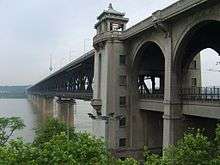 | 1957 | 1,670 m (5,480 ft) | 128 m (420 ft) | truss | 
4-lane
Jingguang R.R. | 30°32′59″N 114°17′18″E / 30.5497°N 114.2882°E / 30.5497; 114.2882 (Wuhan Yangtze River Bridge) |
| Wuhan Metro Line 4 Tunnel |  | 2014 | 2,994 m (9,823 ft) (left tube)
3,003 m (9,852 ft)(right tube) | – | tunnel | | |
| Yingwuzhou Bridge |  | 2014 | 2,300 m (7,500 ft) | 850 m (2,790 ft) | suspension | Wuhan Second Ring Road | 30°31′51″N 114°16′46″E / 30.5308°N 114.2794°E / 30.5308; 114.2794 (Yingwuzhou Yangtze River Bridge) |
| Baishazhou Bridge |  | 2000 | 3,589 m (11,775 ft) | 618 m (2,028 ft) | cable-stayed | Wuhan Third Ring Road | 30°29′05″N 114°14′44″E / 30.4846°N 114.2455°E / 30.4846; 114.2455 (Baishazhou Yangtze River Bridge) |
| Junshan Bridge |  | 2001 | 2,847 m (9,341 ft) | 460 m (1,510 ft) | cable-stayed | 

 | 30°22′27″N 114°08′25″E / 30.374028°N 114.140278°E / 30.374028; 114.140278 (Junshan Yangtze River Bridge) |
| Jingyue Bridge |  | Jianli, Yueyang | Hubei,
Hunan | 2010 | 5,400 m (17,700 ft) | 816 m (2,677 ft) | cable-stayed | 
6-lane | 29°32′40″N 113°13′21″E / 29.54434°N 113.222433°E / 29.54434; 113.222433 (Jingyue Yangtze River Bridge) |
| Jingzhou Bridge |  | Jingzhou | Hubei
western | 2002 | 4,177 m (13,704 ft) | 500 m (1,600 ft) | cable-stayed | 
4-lane | 30°18′32″N 112°12′59″E / 30.308837°N 112.21628°E / 30.308837; 112.21628 (Jingzhou Yangtze River Bridge) |
| Zhicheng Bridge |  | Zhicheng | 1971 | 1,742.3 m (5,716 ft) | 160 m (520 ft) | truss | .svg.png)
Jiaoliu R.R. | 30°17′10″N 111°31′35″E / 30.286086°N 111.526442°E / 30.286086; 111.526442 (Zhicheng Yangtze River Bridge) |
| Yichang Bridge | 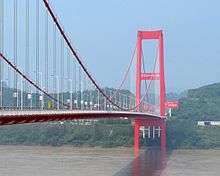 | Yichang | 2001 | 1,187 m (3,894 ft) | 960 m (3,150 ft) | suspension | 
.svg.png) | 30°34′11″N 111°23′30″E / 30.569601°N 111.391536°E / 30.569601; 111.391536 (Yichang Yangtze River Highway Bridge) |
| Yichang Railway Bridge | 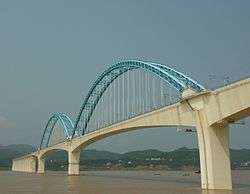 | 2008 | 2,446 m (8,025 ft) | 275 m (902 ft) (x2) | truss and arch | Yiwan R.R.
2-track | 30°39′21″N 111°19′32″E / 30.655944°N 111.325583°E / 30.655944; 111.325583 (Yichang Yangtze River Railway Bridge) |
| Yiling Bridge |  | 2001 | 936 m (3,071 ft) | 348 m (1,142 ft) (x2) | cable-stayed | 4-lane highway | 30°41′03″N 111°17′22″E / 30.684131°N 111.289515°E / 30.684131; 111.289515 (Yiling Yangtze River Bridge) |
| Xiling Bridge |  | 1996 | 1,119 m (3,671 ft) | 900 m (3,000 ft) | suspension | 4-lane highway | 30°49′43″N 111°02′47″E / 30.8285°N 111.0465°E / 30.8285; 111.0465 (Xiling Yangtze River Bridge) |
| Badong Bridge |  | Badong | 2004 | 728 m (2,388 ft) | 388 m (1,273 ft) | cable-stayed | .svg.png) | 31°02′55″N 110°19′42″E / 31.048556°N 110.328472°E / 31.048556; 110.328472 (Badong Yangtze River Bridge) |
| Wushan Bridge | 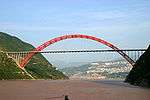 | Wushan County | Chongqing | 2005 | 612 m (2,008 ft) | 460 m (1,510 ft) | arch | Road | 31°03′47″N 109°54′08″E / 31.063056°N 109.902111°E / 31.063056; 109.902111 (Wushan Yangtze River Bridge) |
| Fengjie Bridge |  | Fengjie | 2005 | 893 m (2,930 ft) | 460 m (1,510 ft) | cable-stayed | Road
S201 | 31°01′13″N 109°28′51″E / 31.020306°N 109.480944°E / 31.020306; 109.480944 (Fengjie Yangtze River Bridge) |
| Yunyang Bridge |  | Yunyang | 2005 | 637 m (2,090 ft) | 318 m (1,043 ft) | cable-stayed | Road | 30°54′56″N 108°42′42″E / 30.9155°N 108.71175°E / 30.9155; 108.71175 (Yunyang Yangtze River Bridge) |
| Second Wanzhou Bridge |  | Wanzhou | 2004 | 1,153.86 m (3,786 ft) | 580 m (1,900 ft) | suspension | 4-lane highway | 30°49′33″N 108°24′17″E / 30.825889°N 108.404778°E / 30.825889; 108.404778 (Second Wanzhou Yangtze River Bridge) |
| Wanzhou Railway Bridge | 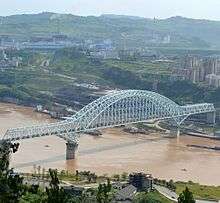 | 2005 | 1,106 m (3,629 ft) | 360 m (1,180 ft) | arch | Yiwan Railway
2-track | 30°46′11″N 108°25′00″E / 30.769778°N 108.416528°E / 30.769778; 108.416528 (Wanzhou Railway Bridge) |
| Wanxian Bridge | 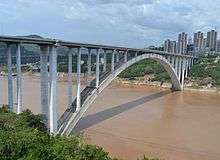 | 1997 | 864 m (2,835 ft) | 420 m (1,380 ft) | arch | .svg.png) | 30°45′35″N 108°25′09″E / 30.759611°N 108.419278°E / 30.759611; 108.419278 (Wanzhou Bridge) |
| Zhongxian Bridge | 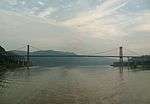 | Zhong County | 2001 | 1,200 m (3,900 ft) | 560 m (1,840 ft) | suspension | 4-lane S302 | 30°18′07″N 108°02′57″E / 30.301833°N 108.049111°E / 30.301833; 108.049111 (Zhongxian Yangtze River Bridge) |
| Zhongzhou Bridge |  | 2009 | 2,145 m (7,037 ft) | 460 m (1,510 ft) | cable-stayed |  | 30°13′55″N 108°00′21″E / 30.231944°N 108.005833°E / 30.231944; 108.005833 (Zhongzhou Yangtze River Bridge) |
| Fengdu Bridge |  | Fengdu | 1997 | 620 m (2,030 ft) | 450 m (1,480 ft) | suspension | S103 | 29°51′20″N 107°40′11″E / 29.855417°N 107.669722°E / 29.855417; 107.669722 (Fengdu Yangtze River Bridge) |
| Hanjiatuo Bridge |  | Fuling | 2012 | 1,137 m (3,730 ft) | 432 m (1,417 ft) | cable-stayed | Yuli Railway | 29°46′04″N 107°25′02″E / 29.767694°N 107.417278°E / 29.767694; 107.417278 (Hanjiatuo Yangtze River Bridge) |
| Shiban'gou Bridge |  | 2009 | 975 m (3,199 ft) | 450 m (1,480 ft) | cable-stayed | 4-lane Fuling Ring Rd | 29°43′50″N 107°24′21″E / 29.730694°N 107.405944°E / 29.730694; 107.405944 (Shiban'gou Yangtze River Bridge) |
| Fuling Bridge |  | 1997 | 631 m (2,070 ft) | 330 m (1,080 ft) | cable-stayed | .svg.png)
4-lane | 29°44′11″N 107°20′49″E / 29.7365°N 107.346806°E / 29.7365; 107.346806 (Fuling Yangtze River Bridge) |
| Lidu Bridge |  | 2007 | 822 m (2,697 ft) | 398 m (1,306 ft) | cable-stayed | Road | 29°43′37″N 107°17′36″E / 29.727028°N 107.293472°E / 29.727028; 107.293472 (Lidu Yangtze River Bridge) |
Qingcaobei Bridge
青草背长江大桥 |  | 2013 | 1,146 m (3,760 ft) | 460 m (1,510 ft) | suspension | Fuling Ring Rd. |
| Changshou Bridge |  | Changshou District | 2009 | 1,160 m (3,810 ft) | 460 m (1,510 ft) | cable-stayed | 4-lane highway | 29°48′59″N 107°03′25″E / 29.816444°N 107.057028°E / 29.816444; 107.057028 (Changshou Yangtze River Bridge) |
| Changshou Railway Bridge |  | 2005 | 898.3 m (2,947 ft) | 192 m (630 ft) | truss | Yuhuai R.R.
2-track | 29°46′22″N 106°59′30″E / 29.772796°N 106.991546°E / 29.772796; 106.991546 (Changshou Yangtze River Railway Bridge) |
| Yuzui Bridge |  | Nan'an District | 2009 | 1,440 m (4,720 ft) | 616 m (2,021 ft) | suspension | 
6-lane | 29°36′41″N 106°46′21″E / 29.611306°N 106.772556°E / 29.611306; 106.772556 (Yuzui Yangtze River Bridge) |
| Dafosi Bridge |  | 2001 | 1,176 m (3,858 ft) | 450 m (1,480 ft) | cable-stayed | 
6-lane | 29°36′24″N 106°34′58″E / 29.606667°N 106.582639°E / 29.606667; 106.582639 (Dafosi Bridge) |
| Chaotianmen Bridge | 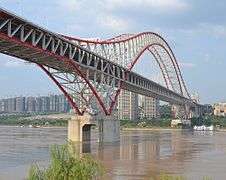 | Yubei District, Nan'an District | 2009 | 4,880 m (16,010 ft) | 552 m (1,811 ft) | arch | 6-lane highway
2-track light rail | 29°35′20″N 106°34′38″E / 29.588871°N 106.57721°E / 29.588871; 106.57721 (Chaotianmen Bridge) |
| Dongshuimen Bridge |  | Yuzhong District, Nan'an District | 2014 | 1,124 m (3,688 ft) | 445 m (1,460 ft) | cable-stayed | 4-lane highway
| 29°33′39″N 106°35′13″E / 29.5608°N 106.5869°E / 29.5608; 106.5869 (Dongshuimen Bridge) |
| Shibanpo Bridge |  | 1980 | 1,103 m (3,619 ft) | 330 m (1,080 ft) | box girder | 8-lane highway | 29°32′44″N 106°33′36″E / 29.545556°N 106.559889°E / 29.545556; 106.559889 (Shibanpo Yangtze River Bridge) |
| Caiyuanba Bridge | 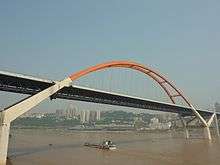 | 2007 | 1,866 m (6,122 ft) | 420 m (1,380 ft) | arch | 6-lane highway
2-track
| 29°32′36″N 106°32′53″E / 29.543222°N 106.547944°E / 29.543222; 106.547944 (Caiyuanba Bridge) |
| E'gongyan Bridge |  | Jiulongpo District, Nan'an District | 2000 | 1,022 m (3,353 ft) | 600 m (2,000 ft) | suspension | 6 lane highway | 29°31′24″N 106°31′41″E / 29.52325°N 106.528056°E / 29.52325; 106.528056 (E'gongyan Bridge) |
| Lijiatuo Bridge |  | 1995 | 1,288 m (4,226 ft) | 444 m (1,457 ft) | cable-stayed | Highway | 29°28′46″N 106°31′42″E / 29.479472°N 106.528444°E / 29.479472; 106.528444 (Lijiatuo Yangtze River Bridge) |
| Masangxi Bridge |  | Dadukou District, Ba'nan District | 2001 | 1,104 m (3,622 ft) | 360 m (1,180 ft) | cable-stayed | 
6-lane | 29°27′28″N 106°29′39″E / 29.457667°N 106.494194°E / 29.457667; 106.494194 (Masangxi Bridge) |
| Yudong Bridge |  | 2008 | 1,541 m (5,056 ft) | 260 m (850 ft) | beam | 6-lane highway
2-track light rail | 29°24′09″N 106°29′48″E / 29.402556°N 106.496611°E / 29.402556; 106.496611 (Yudong Yangtze River Bridge) |
| Baishatuo Railway Bridge | 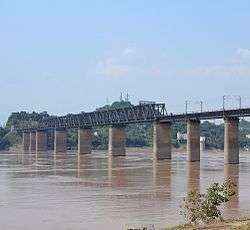 | Dadukou District, Jiangjin District | 1960 | 825 m (2,707 ft) | 80 m (260 ft) | truss | 2-track Chuanqian R.R.
[note 5] | 29°21′13″N 106°25′31″E / 29.353714°N 106.425267°E / 29.353714; 106.425267 (Baishatuo Yangtze River Railway Bridge) |
| Diwei Bridge |  | 2004 | 734 m (2,408 ft) | 345 m (1,132 ft) | cable-stayed | 2-lane road | 29°20′41″N 106°24′17″E / 29.344667°N 106.404722°E / 29.344667; 106.404722 (Diwei Bridge) |
| Guanyinyan Bridge |  | Jiulongpo District, Jiangjin District | 2009 | 1,199 m (3,934 ft) | 436 m (1,430 ft) | cable-stayed | 

6-lane | 29°15′48″N 106°19′16″E / 29.263444°N 106.321222°E / 29.263444; 106.321222 (Guanyinyan Bridge) |
| Dingshan Bridge |  | 2013 | 897 m (2,943 ft) | 464 m (1,522 ft) | cable-stayed | 6-lane road | 29°16′29″N 106°17′14″E / 29.274743°N 106.287242°E / 29.274743; 106.287242 (Dingshan Bridge) |
Jiangjin Bridge
江津长江大桥 |  | Jiangjin District | 1997 | 1,360 m (4,460 ft) | 240 m (790 ft) | beam | .svg.png) | 29°15′50″N 106°15′09″E / 29.263806°N 106.252528°E / 29.263806; 106.252528 (Jiangjin Bridge) |
| Chongqing Yongchuan Bridge | 重庆永川长江大桥 | Jiangjin District,
Yongchuan District | 2014[15] | 1,685 m (5,528 ft) | 608 m (1,995 ft) | cable-stayed | Chongqing Third Ring Rd. | 29°02′30″N 105°53′18″E / 29.041667°N 105.888333°E / 29.041667; 105.888333 (Chongqing Yongchuan Yangtze River Bridge) |
| Bosideng Bridge | 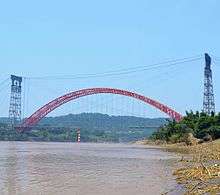 | Hejiang County | Sichuan | 2012 | 841 m (2,759 ft) | 530 m (1,740 ft) | arch |  | 28°53′32″N 105°52′47″E / 28.892182°N 105.879717°E / 28.892182; 105.879717 (Bosideng Bridge) |
| Second Hejiang Bridge |  | 2012 | 1,695 m (5,561 ft) | 420 m (1,380 ft) | cable-stayed |  | 28°50′42″N 105°47′57″E / 28.84491°N 105.7992°E / 28.84491; 105.7992 (Hejiang Bridge) |
Huangyi Bridge
黄舣长江大桥 |  | Luzhou | 2012 | 1,223 m (4,012 ft) | 520 m (1,710 ft) | cable-stayed |  | 28°53′43″N 105°32′53″E / 28.895259°N 105.548094°E / 28.895259; 105.548094 (Huangyi Bridge) |
Taian Bridge
泸州泰安长江大桥 |  | 2008 | 1,573 m (5,161 ft) | 270 m (890 ft) | cable-stayed | Road | 28°52′42″N 105°31′34″E / 28.878326°N 105.526116°E / 28.878326; 105.526116 (Taian Bridge) |
Qiancao Bridge
茜草长江大桥 |  | 2012 | 1,189 m (3,901 ft) | 248 m (814 ft) | extradosed | Road | 28°53′17″N 105°27′20″E / 28.888139°N 105.455556°E / 28.888139; 105.455556 (Qiancao Bridge) |
Luzhou Bridge
泸州长江大桥 |  | 1982 | 1,252 m (4,108 ft) | 170 m (560 ft) | beam | .svg.png) | 28°52′07″N 105°26′27″E / 28.868494°N 105.440806°E / 28.868494; 105.440806 (Luzhou Bridge) |
Luzhou Railway Bridge
泸州铁路长江大桥 |  | 2002 | 602 m (1,975 ft) | 144 m (472 ft) | beam | Longchang-Huangtong R.R.
1-track | 28°46′22″N 105°21′17″E / 28.772813°N 105.35476°E / 28.772813; 105.35476 (Luzhou Railway Bridge) |
Second Luzhou Bridge
泸州长江二桥 |  | 2003 | 1,408 m (4,619 ft) | 253 m (830 ft) | beam | 
4-lane | 28°45′54″N 105°20′12″E / 28.764941°N 105.336644°E / 28.764941; 105.336644 (Second Luzhou Bridge) |
Jiang'an Bridge
江安长江大桥 | | Jiang'an County | 2008 | 1,093 m (3,586 ft) | 252 m (827 ft) | beam | Road | 28°43′46″N 105°04′58″E / 28.729526°N 105.082659°E / 28.729526; 105.082659 (Jiang'an Bridge) |
| Nanxi Bridge |  | Yibin | 2012 | 1,295 m (4,249 ft) | 820 m (2,690 ft) | suspension |  | 28°47′N 104°57′E / 28.78°N 104.95°E / 28.78; 104.95 (Nanxi Yangtze Bridge) |
Yibin Yangtze Bridge
宜宾长江大桥 [16] |  | 2008 | 928.73 m (3,047.0 ft) | 460 m (1,510 ft) | cable-stayed | 4-lane highway | 28°46′04″N 104°39′14″E / 28.76781°N 104.65386°E / 28.76781; 104.65386 (Yibin Yangtze Bridge) |
Jinsha
| Name |
Image |
Location |
Province |
Opened |
Total length |
Longest Span |
Type |
Carries |
Coordinates |
Yibin Rongzhou Bridge
宜宾戎州大桥 | 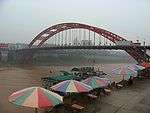 | Yibin | Sichuan
eastern | 2004 | 505 m (1,657 ft) | 260 m (850 ft) | arch | road | 28°46′00″N 104°38′19″E / 28.7667°N 104.6386°E / 28.7667; 104.6386 (Yibin Rongzhou Bridge) |
Yibin Xiaonanmen Bridge
宜宾小南门大桥 |  | 1990 | 387 m (1,270 ft) | 260 m (850 ft) | arch | road | 28°45′50″N 104°37′30″E / 28.7639°N 104.625°E / 28.7639; 104.625 (Yibin Xiaonanmen Bridge) |
| Yibin Jinsha River Railway Bridge | 宜宾金沙江铁路大桥 | 1968 | 400 m (1,300 ft) | 176 m (577 ft) | beam | Yigong R.R. | 28°45′33″N 104°37′02″E / 28.7592°N 104.6172°E / 28.7592; 104.6172 (Yibin Jinsha River Railway Bridge) |
Yibin Zhongba Bridge
宜宾中坝大桥 |  | 2003 | 427 m (1,401 ft) | 252 m (827 ft) | cable-stayed | road | 28°45′21″N 104°36′39″E / 28.7558°N 104.6108°E / 28.7558; 104.6108 (Yibin Zhongba Bridge) |
| Yibin Tianchi Bridge | 宜宾天池大桥 | 2011 | 653 m (2,142 ft) | 220 m (720 ft) | rigid frame | road | 28°42′25″N 104°34′36″E / 28.7069°N 104.5766°E / 28.7069; 104.5766 (Yibin Tianchi Bridge) |
| Yibin Mamingxi Bridge | 马鸣溪大桥 | 1979 | 245 m (804 ft) | 150 m (490 ft) | deck arch | .svg.png) | 28°42′04″N 104°33′24″E / 28.7011°N 104.5567°E / 28.7011; 104.5567 (Yibin Mamingxi Bridge) |
Yishui Expressway Bridge
宜水高速公路金沙江大桥 |  | 2005 | 1,712 m (5,617 ft) | 249 m (817 ft) | rigid frame |  | 28°41′20″N 104°31′24″E / 28.6889°N 104.5233°E / 28.6889; 104.5233 (Yishui Expressway Bridge) |
| Shuifu Bridge | 水富大桥 | Yibin,
Zhaotong | Sichuan
Yunnan | 1958 | | | truss | Neikun R.R. | 28°41′51″N 104°25′16″E / 28.6975°N 104.4211°E / 28.6975; 104.4211 (Shuifu Bridge) |
| Xiangjiaba Bridge | 向家坝金沙江大桥 | 2007 | 443 m (1,453 ft) | 170 m (560 ft) | rigid frame | road | 28°38′25″N 104°24′34″E / 28.6402°N 104.4094°E / 28.6402; 104.4094 (Xiangjiaba Bridge) |
| Suijiang Yunchuan Bridge | 绥江云川金沙江特大桥 | 2015[17] | 718 m (2,356 ft) | 228 m (748 ft) | box girder | road | 28°36′50″N 103°59′25″E / 28.6138°N 103.9903°E / 28.6138; 103.9903 (Suijiang Yunchuan Jinsha River Bridge) |
| G213 Jinsha River Bridge | 213国道金沙江大桥 | 2001 | 310 m (1,020 ft) | 150 m (490 ft) | arch | road | 28°39′45″N 103°52′12″E / 28.6625°N 103.87°E / 28.6625; 103.87 (G213 Jinsha River Bridge) |
| Xiluodu Bridge | 溪洛渡大桥 | Liangshan,
Zhaotong | 2005 | | | rigid frame | road | 28°14′30″N 103°40′31″E / 28.2417°N 103.6753°E / 28.2417; 103.6753 (Xiluodu Bridge) |
| Tongyang Bridge | 通阳大桥 | 2008 | 500 m (1,600 ft) | 180 m (590 ft) | arch | .svg.png) | 27°31′54″N 103°11′59″E / 27.5317°N 103.1997°E / 27.5317; 103.1997 (Tongyang Bridge) |
Hulukou Bridge
葫芦口大桥 |  | 1998 | 160 m (520 ft) | | arch | | 26°57′52″N 102°53′24″E / 26.9644°N 102.89°E / 26.9644; 102.89 (Hulukou Bridge) |
| Jiaopingdu Bridge | 皎平渡大桥 | Liangshan,
Kunming | 1991 | 144 m (472 ft) | | cable-stayed | .svg.png) | 26°17′34″N 102°22′59″E / 26.2928°N 102.3831°E / 26.2928; 102.3831 (Jiaopingdu Bridge) |
| Yuzha Bridge | 鱼鲊大桥 | Liangshan,
Panzhihua | Sichuan
southern | 2014 | 398 m (1,306 ft) | 180 m (590 ft) | rigid frame | .svg.png) | 26°22′06″N 101°55′36″E / 26.3683°N 101.9268°E / 26.3683; 101.9268 (Yuzha Jinsha River Bridge) |
G5 Expressway Bridge
西攀高速公路金沙江大桥 |  | Panzhihua | 2008 | 637 m (2,090 ft) | 324 m (1,063 ft) | cable-stayed |  | 26°34′22″N 101°51′07″E / 26.5728°N 101.8519°E / 26.5728; 101.8519 (Xipan Expressway Bridge) |
Chengkun Railway Bridge
成昆铁路金沙江大桥 |  | 1970 | 390 m (1,280 ft) | 192 m (630 ft) | beam | Chengkun R.R. | 26°34′53″N 101°50′11″E / 26.5814°N 101.8364°E / 26.5814; 101.8364 (Chengkun Railway Bridge) |
Qinglongshan Expressway Bridge
丽攀高速公路青龙山大桥 |  | 2014 | 862 m (2,828 ft) | 230 m (750 ft) | rigid frame |  | 26°36′15″N 101°47′42″E / 26.6042°N 101.795°E / 26.6042; 101.795 (Qinglongshan Expressway Bridge) |
Luoguo Bridge
倮果大桥 |  | 1995 | 208 m (682 ft) | 160 m (520 ft) | arch | .svg.png) | 26°36′04″N 101°47′39″E / 26.6011°N 101.7942°E / 26.6011; 101.7942 (Luoguo Bridge) |
| New Midi Bridge | 新密地大桥 | 2011
2013
[note 6] | 296 m (971 ft) | 182 m (597 ft) | arch | road | 26°34′33″N 102°44′59″E / 26.5758°N 102.7497°E / 26.5758; 102.7497 (New Midi Bridge) |
Midi Bridge
密地大桥 | | 1969
2014
[note 7] | 284 m (932 ft) | 181 m (594 ft) | arch | road | 26°34′33″N 102°44′59″E / 26.5758°N 102.7497°E / 26.5758; 102.7497 (Midi Bridge) |
Bingcaogang Bridge
炳草岗大桥 | | 2001 | 516.3 m (1,694 ft) | 200 m (660 ft) | cable-stayed | road | 26°34′32″N 102°42′14″E / 26.5756°N 102.7038°E / 26.5756; 102.7038 (Bingcaogang Bridge) |
New Dukou Bridge
新渡口大桥 | | 2005 | 385.88 m (1,266.0 ft) | 170 m (560 ft) | arch | .svg.png) | 26°33′25″N 101°41′49″E / 26.557°N 101.697°E / 26.557; 101.697 (New Dukou Bridge) |
Hehuachi Bridge
荷花池大桥 | | 1976 | 252.2 m (827 ft) | 110 m (360 ft) | arch | road | 26°34′07″N 101°39′46″E / 26.5686°N 101.6627°E / 26.5686; 101.6627 (Hehuachi Bridge) |
| Hehuachi Railway Bridge | 荷花池铁路桥 | 1995 | | | rigid frame | railway | 26°35′08″N 101°39′16″E / 26.5856°N 101.6544°E / 26.5856; 101.6544 (Hehuachi Railway Bridge) |
Xinzhuang Bridge
新庄大桥 | | 1972 | 323.7 m (1,062 ft) | 146 m (479 ft) | arch | .svg.png) | 26°35′08″N 101°39′17″E / 26.5855°N 101.6546°E / 26.5855; 101.6546 (Xinzhuang Bridge) |
| Dashuijing Bridge | 丽攀高速公路大水井大桥 | 2014 | 475 m (1,558 ft) | 230 m (750 ft) | rigid frame |  | 26°35′25″N 101°37′12″E / 26.5903°N 101.62°E / 26.5903; 101.62 (Dashuijing Bridge) |
| Fala Bridge | 法拉大桥 | 2005 | 233.74 m (766.9 ft) | 190 m (620 ft) | box girder | road | 26°35′15″N 101°36′01″E / 26.5876°N 101.6002°E / 26.5876; 101.6002 (Fala Bridge) |
| Baoding Bridge | 宝鼎大桥 | 1982 | 392 m (1,286 ft) | 170 m (560 ft) | box girder | road | 26°35′48″N 101°34′16″E / 26.5966°N 101.5711°E / 26.5966; 101.5711 (Baoding Bridge) |
| Zhuangshang Bridge | 庄上金沙江特大桥 | 2014 | 370 m (1,210 ft) | 180 m (590 ft) | rigid frame |  | 26°35′33″N 101°29′53″E / 26.5925°N 101.4981°E / 26.5925; 101.4981 (Zhuangshang Bridge) |
| Panzhihua Guanyinyan Bridge | 观音岩大桥 | 2005 | | 114 m (374 ft) | arch | road | 26°31′53″N 101°26′49″E / 26.5314°N 101.4470°E / 26.5314; 101.4470 (Panzhihua Guanyinyan Bridge) |
| New Jinjiang Bridge | 新金江大桥 | Lijiang | Yunnan
| 2012 | 325 m (1,066 ft) | | rigid frame | .svg.png) | 26°11′03″N 100°35′37″E / 26.1842°N 100.5936°E / 26.1842; 100.5936 (New Jinjiang Bridge) |
| Second Zhongjiang Bridge | 中江二桥 | Dali | | 250 m (820 ft) | 170 m (560 ft) | suspension | road | 26°28′59″N 100°25′09″E / 26.4831°N 100.4192°E / 26.4831; 100.4192 (Second Zhongjiang Bridge) |
| Zhongjiang Bridge | 中江大桥 | 2005 | 225 m (738 ft) | 138 m (453 ft) | suspension | road | 26°29′45″N 100°24′45″E / 26.4958°N 100.4125°E / 26.4958; 100.4125 (Zhongjiang Bridge) |
| Longkaikou Bridge | 龙开口大桥 | | | | rigid frame | road | 26°43′06″N 100°23′29″E / 26.7183°N 100.3914°E / 26.7183; 100.3914 (Longkaikou Bridge) |
| Jinlong Bridge | 金龙桥 | Lijiang | 1936
[note 8] | 116 m (381 ft) | 90 m (300 ft) | simple suspension | foot traffic | 26°46′58″N 100°23′09″E / 26.7828°N 100.3858°E / 26.7828; 100.3858 (Jinlong Bridge) |
| Jin'an Bridge | 金安桥 | 1982 | 186 m (610 ft)[18] | 110 m (360 ft)[18] | arch | .svg.png) | 26°47′47″N 100°25′47″E / 26.7964°N 100.4297°E / 26.7964; 100.4297 (Jin'an Bridge) |
| New Jin'an Bridge | 新金安桥 | | | | arch | road | 26°47′55″N 100°26′24″E / 26.7986°N 100.44°E / 26.7986; 100.44 (New Jin'an Bridge) |
| New Shudi Bridge | 新树底大桥 | 2003
[18] | 179.6 m (589 ft)[18] | 120 m (390 ft)[18] | rigid frame | .svg.png) | 27°00′23″N 100°26′16″E / 27.0064°N 100.4378°E / 27.0064; 100.4378 (New Shudi Bridge) |
| Ahai Bridge | 阿海大桥 | | 270 m (890 ft) | | arch | road | 27°20′06″N 100°30′24″E / 27.335°N 100.5067°E / 27.335; 100.5067 (Ahai Bridge) |
| Fengke Bridge | 奉科大桥 | | 216 m (709 ft) | 150 m (490 ft) | rigid frame | road | 27°36′15″N 100°26′37″E / 27.6042°N 100.4436°E / 27.6042; 100.4436 (Fengke Bridge) |
| Liyuan Bridge | 梨园大桥 | Dêqên,
Lijiang | | | | arch | road | 27°41′13″N 100°17′23″E / 27.6869°N 100.2897°E / 27.6869; 100.2897 (Liyuan Bridge) |
Jihong Bridge
继红桥 | | 1971 | 150 m (490 ft) | 75 m (246 ft) | arch | road | 27°07′53″N 100°03′19″E / 27.1314°N 100.0552°E / 27.1314; 100.0552 (Jihong Bridge) |
| | | 350 m (1,150 ft) | 200 m (660 ft) | suspension | road,very narrow | 27°03′04″N 100°04′38″E / 27.0511°N 100.0772°E / 27.0511; 100.0772 |
| Songyuan Bridge | 松园大桥 | 1996 | | 170 m (560 ft) | arch | .svg.png) | 27°00′18″N 100°04′17″E / 27.005°N 100.0714°E / 27.005; 100.0714 (Songyuan Bridge) |
| | | | | suspension | road | 27°09′10″N 99°49′28″E / 27.1528°N 99.8244°E / 27.1528; 99.8244 |
| Qizong Bridge | 其宗大桥 | Dêqên | 1989 | | | cable-stayed | .svg.png) | 27°34′34″N 99°31′43″E / 27.576°N 99.5286°E / 27.576; 99.5286 (Qizong Bridge) |
New Helong Bridge
新贺龙桥 | | Garzê,
Dêqên | Sichuan,
Yunnan | | | | arch | .svg.png) | 28°10′16″N 99°23′22″E / 28.1711°N 99.3894°E / 28.1711; 99.3894 (Xinhe Bridge) |
| Quzong Bridge | 曲宗大桥 | | | | arch | road | 28°21′10″N 99°13′47″E / 28.3528°N 99.2296°E / 28.3528; 99.2296 (Quzong Bridge) |
| | | | | suspension | road | 28°29′06″N 99°11′14″E / 28.485°N 99.1872°E / 28.485; 99.1872 |
| Yinduba Bridge | 因都坝大桥 | 2009 | | 90 m (300 ft) | arch | road | 28°36′22″N 99°09′59″E / 28.6061°N 99.1664°E / 28.6061; 99.1664 (Yinduba Bridge) |
| | | | | simple suspension | foot path | 28°44′47″N 99°07′37″E / 28.7464°N 99.1269°E / 28.7464; 99.1269 |
| | | | | simple suspension | foot path | 28°53′23″N 99°07′03″E / 28.8897°N 99.1175°E / 28.8897; 99.1175 |
| | | | | suspension | road | 29°13′44″N 99°06′55″E / 29.2288°N 99.1153°E / 29.2288; 99.1153 |
| | Garzê,
Chamdo | Sichuan,
Tibet | | | | suspension | road | 29°18′14″N 99°03′56″E / 29.3039°N 99.0656°E / 29.3039; 99.0656 |
| | | | | suspension | road | 29°21′01″N 99°03′59″E / 29.3503°N 99.0664°E / 29.3503; 99.0664 |
| | | | | suspension | foot path | 29°29′02″N 99°03′29″E / 29.4839°N 99.0581°E / 29.4839; 99.0581 |
New Zhubalong Bridge
新竹巴龙金沙江大桥 | | | | | beam | .svg.png) | 29°46′11″N 99°00′35″E / 29.7697°N 99.0097°E / 29.7697; 99.0097 (New Zhubalong Bridge) |
| Old Zhubalong Bridge | 老竹巴龙金沙江大桥 | 1964 | | | beam | foot path
[note 9] | 29°46′29″N 99°00′39″E / 29.7747°N 99.0108°E / 29.7747; 99.0108 (Old Zhubalong Bridge) |
| | | | | suspension | foot path | 29°56′10″N 99°03′38″E / 29.9361°N 99.0606°E / 29.9361; 99.0606 |
| | | | | suspension | foot path | 30°05′05″N 99°02′35″E / 30.0847°N 99.0431°E / 30.0847; 99.0431 |
| | | | | simple suspension | foot path | 30°44′39″N 98°57′39″E / 30.7442°N 98.9608°E / 30.7442; 98.9608 |
| | | | | simple suspension | foot path | 31°12′51″N 98°37′25″E / 31.2141°N 98.6235°E / 31.2141; 98.6235 |
| | | | | simple suspension | foot path | 31°19′11″N 98°49′07″E / 31.3198°N 98.8186°E / 31.3198; 98.8186 |
| | | | | simple suspension | foot path | 31°26′08″N 98°50′23″E / 31.4356°N 98.8398°E / 31.4356; 98.8398 |
| New Gangtuo Bridge | 新岗托大桥 | | | | beam | .svg.png) | 31°37′26″N 98°35′35″E / 31.6240°N 98.5931°E / 31.6240; 98.5931 (New Gangtuo Bridge) |
| Gangtuo Bridge | 岗托大桥 | 1974 | 140 m (460 ft) | 70 m (230 ft) | arch | road | 31°37′32″N 98°35′26″E / 31.6256°N 98.5906°E / 31.6256; 98.5906 (Gangtuo Bridge) |
| | | | | suspension | foot path | 31°41′32″N 98°33′26″E / 31.6921°N 98.5571°E / 31.6921; 98.5571 |
| Dengmanusangba Bridge | 邓玛奴桑巴桥 | 1988 | 150 m (490 ft) | | suspension | road | 32°27′37″N 97°59′47″E / 32.4603°N 97.9963°E / 32.4603; 97.9963 (Dengmanusangba Bridge) |
| | Garzê,
Yushu | Sichuan,
Qinghai | | | | suspension | road | 32°38′02″N 97°32′24″E / 32.6339°N 97.5399°E / 32.6339; 97.5399 |
Tongtian
Tuotuo
Bridges and tunnels under construction
Chang Jiang
| Name |
Location |
Expected opening |
Total length |
Longest span |
Type |
Carries |
Coord. |
Shanghai-Nantong Bridge
沪通长江大桥 | Nantong & Zhangjiagang, Jiangsu | 2019 | ~7,000 m (23,000 ft) | 1,092 m (3,583 ft) | cable-stayed | 
Hutong R.R. | 32°00′33″N 120°44′34″E / 32.009167°N 120.742778°E / 32.009167; 120.742778 (Shanghai-Nantong Yangtze River Bridge) |
| Nanjing Metro Line 3 Tunnel | Nanjing, Jiangsu | 2015 | 3,100 m (10,200 ft) | - | tunnel | Nanjing Metro Line 3 |
| Nanjing Yangzijiang Tunnel[19] | Nanjing, Jiangsu | 2015 | 7,368 m (24,173 ft) | - | tunnel | road |
Yijishan Bridge
弋矶山长江大桥 | Wuhu, Anhui | 2018 | 1,232 m (4,042 ft) | 588 m (1,929 ft) | cable-stayed | Shangqiu-Hangzhou H.S.R.
road | 31°21′07″N 118°20′47″E / 31.3519°N 118.3464°E / 31.3519; 118.3464 (Yijishan Yangtze River Bridge) |
Second Wuhu Bridge
芜湖长江二桥 | Wuhu, Anhui | 2017 | 1,622 m (5,322 ft) | 806 m (2,644 ft) | cable-stayed |  | 31°14′09″N 118°08′14″E / 31.235833°N 118.137222°E / 31.235833; 118.137222 (Second Wuhu Yangtze River Bridge) |
Chizhou Bridge
池州长江大桥 | Chizhou, Anhui | 2019[20] | 5,818 m (19,088 ft) | 828 m (2,717 ft) | cable-stayed |  | |

Tongling Road-Rail Bridge
铜陵长江公铁大桥 | Tongling, Anhui | 2015-07-01[21] | 1,290 m (4,230 ft) | 630 m (2,070 ft) | cable-stayed | 
Hefu H.S.R. | 31°04′58″N 117°58′26″E / 31.082778°N 117.973889°E / 31.082778; 117.973889 (Tongling Yangtze River Road-Rail Bridge) |
| Anqing Railway Bridge | Anqing, Anhui | 2019 | 2,997 m (9,833 ft) | 580 m (1,900 ft) | cable-stayed | Nanjing–Anqing Intercity Railway | 30°29′57″N 117°04′17″E / 30.4991°N 117.0714°E / 30.4991; 117.0714 (Anqing Railway Yangtze River Bridge) |
Wangdong Bridge
望东长江公路大桥 | Wangjiang and Dongzhi, Anqing | 2016 | 4,035 m (13,238 ft) | 638 m (2,093 ft) | cable-stayed | Road | 30°05′15″N 116°47′07″E / 30.0875°N 116.7853°E / 30.0875; 116.7853 (Wangdong Yangtze River Bridge) |
Yangsigang Bridge
杨泗港长江大桥 | Wuhan, Hubei | 2019 | 4,318 m (14,167 ft) | 1,700 m (5,600 ft) | suspension | Road[22] | 30°30′24″N 114°15′24″E / 30.5067°N 114.2568°E / 30.5067; 114.2568 (Yangsigang Yangtze River Bridge) |
Dunkou Bridge
沌口长江大桥 | Wuhan, Hubei | 2017 | 3,287 m (10,784 ft) | 760 m (2,490 ft) | cable-stayed | Wuhan 4th Ring Rd.[22] | 30°26′11″N 114°11′40″E / 30.436389°N 114.194444°E / 30.436389; 114.194444 (Dunkou Yangtze River Bridge) |
Gongan Bridge
公安长江大桥 | Jingzhou, Hubei | 2018 | 2,015.9 m (6,614 ft) | 518 m (1,699 ft) | cable-stayed | Shashi-Gongan Hwy
Jingzhou-Yueyang R.R. | 30°04′06″N 112°19′59″E / 30.068333°N 112.333056°E / 30.068333; 112.333056 (Gongan Yangtze River Bridge), |
Miaozui Bridge
庙嘴长江大桥}} | Yichang, Hubei | 2015? | 3,234.7 m (10,613 ft) | 838 m (2,749 ft) | suspension
cable-stayed
[note 13] | road |
Fuma Bridge
驸马长江大桥 | Wanzhou, Chongqing | 2017[23] | 2,003 m (6,572 ft) | 1,050 m (3,440 ft) | suspension |  |
Third Wanzhou Bridge
万州长江三桥 | Wanzhou, Chongqing | 2018 | 2,120 m (6,960 ft) | 30 m (98 ft) | cable-stayed | road | 30°47′14″N 108°24′11″E / 30.787222°N 108.403056°E / 30.787222; 108.403056 (Dunkou Yangtze River Bridge) |
Second Fengdu Bridge
重庆丰都长江二桥 | Fengdu, Chongqing | 2016 | 2,140 m (7,020 ft) | 680 m (2,230 ft) | cable-stayed | road | 29°52′8.7″N 107°42′32.1″E / 29.869083°N 107.708917°E / 29.869083; 107.708917 (Second Fengdu Bridge) |
Cuntan Bridge
寸滩长江大桥 | Jiangbei, Chongqing | 2016 | 1,600 m (5,200 ft) | 880 m (2,890 ft) | suspension | road | 29°37′14.2″N 106°36′21.8″E / 29.620611°N 106.606056°E / 29.620611; 106.606056 (Cuntan Bridge) |
New Baishatuo Bridge
新白沙沱长江大桥 | Dadukou & Jiangjin, Chongqing | 2017[24] | 920 m (3,020 ft) | 432 m (1,417 ft) | cable-stayed | Chongqing–Guizhou H.S.R. | 29°21′05″N 106°25′46″E / 29.351389°N 106.429444°E / 29.351389; 106.429444 (New Baishatuo Yangtze River Bridge) |
Jiangjin Jijiang Bridge
江津几江长江大桥 | Jiangjin, Chongqing | 2016–11[25] | 1,897 m (6,224 ft) | 600 m (2,000 ft) | cable-stayed | 6-lane Highway | |
Hejiang Yangtze River Bridge
合江长江大桥 | Hejiang, Sichuan | 2020[26] | 1,560 m (5,120 ft) | 507 m (1,663 ft) | arch | road |
Upstream sections
| Name |
Location |
Expected opening |
Total length |
Main span |
Type |
Carries |
Coord. |
Yibin Jinsha River Road Rail Bridge
宜宾金沙江公铁大桥 | Yibin, Sichuan | 2017 | 1,874.9 m (6,151 ft) | 336 m (1,102 ft) | arch | road
Chengdu-Guiyang H.S.R. | 28°43′43″N 104°35′06″E / 28.7287°N 104.5851°E / 28.7287; 104.5851 (Yibin Jinsha River Road Rail Bridge) |
Puhe Bridge
普和大桥 | Yibin, Sichuan | 2016 | 268 m (879 ft) | 180 m (590 ft) | rigid frame | road | 28°41′45″N 104°32′55″E / 28.6957°N 104.5487°E / 28.6957; 104.5487 (Puhe Jinsha River Bridge) |

New Hulukou Bridge
新葫芦口大桥 | Liangshan, Sichuan
Zhaotong, Yunnan | 2016[27] | 959 m (3,146 ft) | 656 m (2,152 ft) | suspension | road | 26°58′17″N 102°53′30″E / 26.9714°N 102.8918°E / 26.9714; 102.8918 (New Hulukou Jinsha River Bridge) |
Jindong Bridge
金东大桥 | Liangshan, Sichuan
Kunming, Yunnan | 2016[28] | 941 m (3,087 ft) | 730 m (2,400 ft) | suspension | road | 26°30′36″N 103°02′26″E / 26.5099°N 103.0406°E / 26.5099; 103.0406 (Jindong Jinsha River Bridge) |
Wudongde Bridge
乌东德大桥 | Liangshan, Sichuan
Kunming, Yunnan | ? | ~400 m (1,300 ft) | 90 m (300 ft) | rigid frame | road | 26°21′07″N 102°35′50″E / 26.352°N 102.5971°E / 26.352; 102.5971 (Wudongde Jinsha River Bridge) |
Hemenkou Bridge
河门口大桥 | Liangshan, Sichuan
Kunming, Yunnan | 2017 | 522 m (1,713 ft) | 240 m (790 ft) | rigid frame | road | 26°18′27″N 102°38′04″E / 26.3074°N 102.6344°E / 26.3074; 102.6344 (Hemenkou Jinsha River Bridge) |
Second Chengkun Railway Bridge
成昆二线金沙江大桥 | Panzhihua, Sichuan | 2020 | | | cable-stayed | Second Chengkun R.R. | 26°36′13″N 101°48′50″E / 26.6037°N 101.8139°E / 26.6037; 101.8139 (Second Chengdu-Kunming Railway Jinsha River Bridge) |
Taku Bridge
塔库金沙江大桥 | Lijiang, Yunnan | 2018 | 1,522 m (4,993 ft) | 1,190 m (3,900 ft) | suspension |  | 26°43′22″N 100°23′20″E / 26.7229°N 100.3888°E / 26.7229; 100.3888 (Taku Jinsha River Bridge) |
G214 New Tongtian River Bridge
214国道新通天河大桥 | Yushu, Qinghai | ? | ~800 m (2,600 ft) | | rigid frame | road | 33°00′20″N 97°14′56″E / 33.0055°N 97.249°E / 33.0055; 97.249 (G214 New Tongtian River Bridge) |
Planned bridges
| Name |
Location |
Expected opening |
Total length |
Main span |
Type |
Carries |
| Wuxue Bridge | Wuxue, Hubei & Yangxin, Jiangxi | 2018 | 4,331 m (14,209 ft) | 1,328 m (4,357 ft)[29] | cable-stayed | Macheng-Yangxin Hwy | 29°50′25″N 115°30′22″E / 29.840278°N 115.506111°E / 29.840278; 115.506111 (Wuxue Yangtze River Bridge) |
|
| Chibi Bridge | Honghu & Chibi, Hubei | 2018 | 4,557 m (14,951 ft) | 720 m (2,360 ft) | cable-stayed | S214 | 29°51′09″N 113°34′42″E / 29.8525°N 113.578333°E / 29.8525; 113.578333 (Chibi Yangtze River Bridge) |
See also
Notes
- 1 2 3 Shanghai Yangtze River Tunnel, connecting Pudong on the south bank of the river and Changxing Island, the Shanghai Yangtze River Bridge between Changxing and Chongming Island, and the Chongming–Qidong Yangtze River Bridge linking Chongming with Qidong on the north bank of the river, collectively form one crossing near the river's mouth.
- ↑ The Taizhou Bridge complex crosses two branch streams of the Yangtze and the Yangzhong island in the middle of the river. The bridge over the left stream is a suspension bridge with three towers and two spans. The bridge over the right stream is a pair of box-girder bridges configured as 85+125x3+85 = 545 m (1,788 ft) and 85+125x2+85=420 m (1,380 ft)
- ↑ Runyang Bridge complex crosses the Yangtze via Shiye Island and consists of two main bridges. The Runyang North Bridge is a suspension bridge over the north branch stream between the island and Yangzhou. The Runyang South Bridge is a cable-stayed bridge over the south branch stream between the island and Zhenjiang.
- ↑ The Ma'anshan Bridge complex crosses two branch streams of the Yangtze and the Xiaohuangzhou island in the middle of the river. The bridge over the left stream is a suspension bridge with three towers and two spans. The bridge over the right stream is a cable-stayed bridge with three towers and two spans.
- ↑ The second track on the Baishatuo Yangtze River Railway Bridge was added in 1978.
- ↑ The upstream span of the New Midi Bridge opened in 2011 and the downstream span opened in 2013
- ↑ The Midi Bridge closed in 2014.
- ↑ The Jinlong Bridge was first built in 1880. It was destroyed in a flood in 1935 and rebuilt in 1936.
- ↑ The Old Zhubalong Bridge has been closed to vehicular traffic.
- ↑ The Qumarlêb Tongtian River Bridge, a rigid frame bridge that built in 2012, replaced a beam bridge built in 1989.
- ↑ The G109 Tuotuo River Bridge, first built in 1958, was rebuilt in 1987 and 2002.
- ↑ The Qinghai-Tibet Railway Tuotuo River Bridge was completed in 2002 and opened to rail traffic in 2006.
- ↑ The Miaozui Yangtze River Bridge, which spans across the right and left streams of the river and an island in the river, is composed of several bridge sections including a longer suspension bridge with a main span of 838 m (2,749 ft) and a shorter cable-stayed bridge with a main span of 210 m (690 ft).
References
External links










